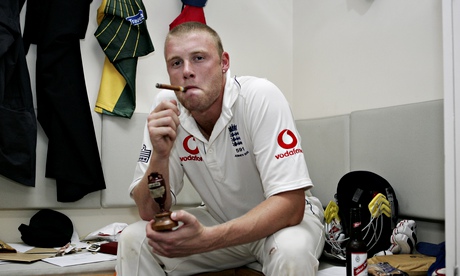THE PRICE OF EVERYTHING, THE VALUE OF NOTHING
You wouldn’t call it a great picture. Not by any means. That’s why I keep it in a box underneath the sofa in the spare bedroom. I dug it out the other day, brushed off the dust. It was every bit as inept a bit of photography as I remembered it to be. There’s a random hand holding a mobile phone in the bottom corner. Front and centre: three stewards in fluorescent jackets, two policewomen with their backs turned, an orange drinks tub with “Gatorade” written on the side. And it’s all squint. The image lists to the left. Which is unsurprising, since neither of us was sober enough to hold a camera straight. But it makes me smile.
In the middle, over on the left of the frame, are the players, just starting their lap of honour. There’s Andrew Flintoff. Unmistakable. Legs straight but spread, head up, one arm aloft. Marcus Trescothick, holding the crystal replica of the urn in both hands, high above his head. Simon Jones, applauding the crowd, unaware that he had already played his last Test, and also that, at that precise moment, Andrew Strauss was, I think, about to flick the back of his right ear. Matthew Hoggard, blond mop poking out from underneath blue cap. Steve Harmison, holding the neck of a bottle of champagne in his right hand. And behind them, thousands of fans, together in standing ovation, celebrating England’s first Ashes win since 1986-87.
Almost a decade ago, now, 2005 and all that. Easy to forget how extraordinary it was. How, during the week before the fifth Test at The Oval, tickets were selling for over £1,000 each, and that a penthouse flat with a view of the ground was taken on a five-day let for 20 times that. How the general secretary of the TUC urged employers to “make arrangements to allow people to follow their heroes”, and trading on the stock market fell 20% that Monday. When it was over the players became the first living people outside of the Royal family to appear on a set of stamps, there were 100,000 advance orders for a Flintoff 2006 calendar, the team even recorded a version of Jerusalem that reached No19 in the charts.
It was, as Kevin Pietersen, and his ghost, write in one of the more acute pieces of analysis in KP: The Autobiography, “a moment in time” that cricket “will never have back again”. Back then, they write, “English cricket had something it’s lost. Superstars. Sexiness. Momentum. The right to be called the national sport.” But then there were special circumstances. It had been a generation since England had last won the Ashes, they were playing a team acknowledged as one of the greatest in the history of the sport, and the cricket itself was compelling. And, of course, it was on terrestrial TV. They estimate that a total of 22.65m people watched a minimum of 30 minutes of live cricket at least one point that summer. The audience peaked at 8.4m. Compared to the last series in England, in 2001, the overall numbers had almost doubled. And, more important still, there was a 74% rise among under-15s.
And that was when the curtain came down. “English cricket,” Pietersen writes, “took the decision to wind its neck back in.” Unless you pay extra for the privilege, the only international cricket you’ve seen on your TV since has been in highlights packages. The following home Ashes, in 2009, reached a peak of just under 2m viewers. Some knew it was the wrong thing to do at the time. The select committee for culture, media, and sport held an inquiry, heard evidence from a group called the Keep Cricket Free campaign, which had over 15,000 members. It concluded that blame fell on both the BBC and ITV, neither of whom bid for the rights to show highlights, much less full matches. Channel 4 did make a bid of £54m, to show two thirds of England’s home Tests between 2006 and 2009. Sky, on the other hand, offered £220m to show every international game, and 50 domestic matches as well.
Andy Duncan, the chief executive of Channel 4, described it at the time as “a simple trade-off”, of “sufficient money and exposure for a lot more money and no exposure.” The ECB justified it on the grounds that, in the words of the chief executive David Collier, “the most important factor in promoting interest in cricket generally and in inspiring the next generation of cricketers is the success of the England team”, and that, he felt, depended on investments made possible by the additional revenues. Otherwise, he said, it was “back to the bad old days”.
There was a measure of truth in that. But much obfuscation too. The real drop-off in revenue would only have amounted to £7m a year. That was the price the ECB put on free-to-air coverage. The extra money earned has been parlayed into bolstering their own reserves, and the development of both women’s cricket and disability cricket, both of which are as healthy in this country now, eight years later, as they have been at any point in their history. The fortunes of the men’s team, of course, are a little more complicated, and the effect of the investment on “grassroots cricket”, to use a favourite phrase of Collier’s, is altogether harder to gauge.
None of which accounts for anything like as much as the single largest portion of the ECB’s expenditure, which is the £30m-odd they pay out to the counties each year in “recognition of the costs they incur in participating in the board’s competitions.” Without the payments, many of the counties would have long since gone to the wall. And without the support of the counties, the ECB chairman wouldn’t have his job. The relationship is inextricable. English cricket has become utterly dependent on Sky’s money.
In 2009 David Davies, conducting an investigation at the behest of the Labour government, suggested that home Ashes Tests ought to be returned to the list of protected sporting events. Giles Clarke warned, somewhat melodramatically, that the upshot would be “absolutely devastating” for English cricket, leading to a “decade of decay” and a “return to extreme poverty”. The idea of adding home Tests to the ‘crown jewels’ has since been kicked so deep into the long grass that no one even noticed that the promised review in 2013 never came to pass. The ECB point out that the last time the rights were available, no terrestrial station bid for them. “How can you sell something no one wants to buy?” they say. Why would anyone would try to buy what they know the owner doesn’t want to sell?
• This is an extract taken from the Spin, the Guardian’s weekly cricket email. To subscribe just visit this page, find the Spin and then follow the instructions.











